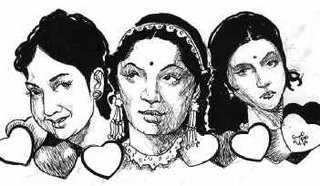THE GOOD DOCTOR

Another remarkable thing about Dr. Betty Chinniah was her handwriting. It was very clear and beautiful, writes J. VASANTHAN.
I FIRST met Dr. Betty Chinniah when she was the superintendent of the Mission Hospital, Madurai. This was just a few months after I had moved to Madurai to join the American College as a lecturer. I had been told that Dr.Chinniah was a strict disciplinarian who came down heavily on the lazy and the corrupt.
An erudite doctor
I had taken a patient to the hospital, and while the patient went in to undergo some tests, Dr.Chinniah had a brief chat with me. As soon as I introduced myself , she said that she had heard about me, and started talking about literature, art and dramatics.
I was quite surprised by her knowledge of these subjects. Later I came to know that she was a voracious reader, and that she discussed several subjects with the numerous friends who called on her at her house in the evenings. I also came to know that she never missed a single play put up by my drama group, the Curtain Club.
Good Samaritan
She had an easy camaraderie with people, and had a host of friends. She was a true friend indeed. She went out of her way to help people. When someone asked for her advice about some health problem, she suggested the right doctor, contacted the physician or surgeon and made arrangements for the treatment. Quite often the persons benefiting from these ministrations never bothered to inform her about the outcome. She would then ring up these careless characters and enquire about their present state of health. She was truly a Good Samaritan.
To the rescue
When I had a massive heart attack (myocardial infarction), she rushed to my bedside and took charge. She went about fixing a room and a doctor in a well known hospital and an ambulance to take me there. Her sister, Sweety, volunteered to be one of the stretcher bearers. Both the sisters were constant visitors at the hospital while I was in the intensive care unit.
After a couple of days the doctors there said that there was no hope, and asked my people to take me home and to intimate relatives. Everyone had given up hope, but Dr. Chinniah wouldn't give up. She rushed about hither and thither looking for a doctor. And she found Dr. Pethaperumal, a like-minded physician, who ignored protocol and took over the case. Between him and Dr.Chinniah they succeeded in pulling me through. That was nineteen years ago. And all these nineteen years of my life I owe to Betty Chinniah.
Qualifications
Dr. Chinniah was a highly qualified physician and paediatrician. Long before such things were common, she had earned her FRCP from Edinburgh and her DCH from London. These qualifications sat lightly on her. She never put on any airs.
Another remarkable thing about this doctor was her handwriting. It was very clear and beautiful, unlike that of most others in her profession.
Good Humour
Dr. Chinniah and I liked to rag each other. Once when I happened to be falling ill at frequent intervals, she also was having health problems. As she was leaving for Madras, she raised an admonishing finger and said, "Behave yourself". And I said, "Wish you the same" and got a hearty laugh in reply.
During her final illness when she was in the ICU, I peeped round the curtain, not wanting to disturb her. "Come in. Don't be scared" said the patient from the midst of tubes and respirators.
She passed away last month at the age of 82.
She loved children, and children loved her. She played with them as if she were a child too. As Dr.Chinniah's body was being removed, a little girl from a nearby house stood silently with a devastated look on her face.
That face reflected the sense of loss that all of us felt.
© Copyright 2000 - 2006 The Hindu


